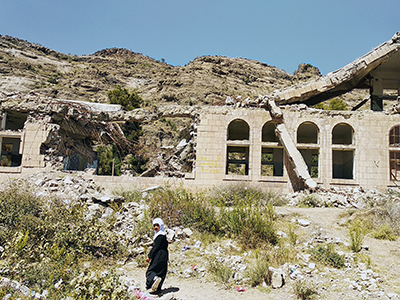
Yemeni authorities must take swift action to protect economic, social, and cultural rights, and to end violations in the face of the country’s dire humanitarian situation.

[fusion_builder_container hundred_percent="no" equal_height_columns="no" menu_anchor="" hide_on_mobile="small-visibility,medium-visibility,large-visibility" class="" id="" background_color="" background_image="" background_position="center center" background_repeat="no-repeat" fade="no" background_parallax="none" enable_mobile="no" parallax_speed="0.3" video_mp4="" video_webm="" video_ogv="" video_url="" video_aspect_ratio="16:9" video_loop="yes" video_mute="yes" video_preview_image="" border_size="" border_color="" border_style="solid" margin_top="" margin_bottom="" padding_top="" padding_right="" padding_bottom="" padding_left=""][fusion_builder_row][fusion_builder_column type="1_1" layout="1_1" spacing="" center_content="no" hover_type="none" link="" min_height="" hide_on_mobile="small-visibility,medium-visibility,large-visibility" class="" id="" background_color="" background_image="" background_position="left top" background_repeat="no-repeat" border_size="0" border_color="" border_style="solid" border_position="all" padding_top="" padding_right="" padding_bottom="" padding_left="" margin_top="" margin_bottom="" animation_type="" animation_direction="left" animation_speed="0.3" animation_offset="" last="no"][fusion_text columns="" column_min_width="" column_spacing="" rule_style="default" rule_size="" rule_color="" hide_on_mobile="small-visibility,medium-visibility,large-visibility" class="" id=""][caption id="attachment_18845" align="aligncenter" width="1024"] A girl walking in front of her school, which was hit by Saudi/UAE-led coalition airstrike. Al-Haqbb, Dhala. ©Mwatana for Human Rights[/caption]Thursday (August 13, 2020)Sana'a – Yemeni authorities must take swift action to protect economic, social, and cultural rights, and to end violations in the face of the country’s dire humanitarian situation, said Mwatana for Human Rights and the Columbia Law School Human Rights Clinic today in their joint submission to the United Nations Committee on Economic, Social, and Cultural Rights. Millions of Yemenis face a food crisis with many at risk of starvation. Too many lack access to clean water, cannot reach or afford adequate health care, and have been deprived of even basic education. With the COVID-19 pandemic now spreading in Yemen, abuses threaten to take an even greater toll.The Yemeni government has not only failed to take steps to respect and protect these essential rights, but has helped block humanitarian aid and essential commercial goods, and allowed allies to attack sites and infrastructure essential to providing food, water, and health care. Government and allied forces have recruited child soldiers and occupied schools. The Ansar Allah (Houthi) armed group has also committed economic, social, and cultural rights abuses in areas under their control, obstructing the delivery of humanitarian aid, emplacing landmines near water sources, recruiting child soldiers, and attacking medical facilities.“Yemenis have been trapped between Ansar Allah (the Houthis) on the one hand and the Yemeni government and its allies, on the other. For Yemenis, day to day life has become a constant struggle, yet the government and its allies have failed to protect essential rights to food, water, health care, and education, even in areas under their control,” said Radhya Almutawakel, Chairperson of Mwatana for Human Rights. “It’s long past time we had answers on how the internationally recognized government plans to better protect these rights, including by finally pressing their partners for an end to abuses, and for accountability.”The joint submission aims to inform the Committee about the most egregious patterns of violations, based on field research and supporting data. These include how parties have impeded humanitarian aid and essential goods; attacked hospitals, food storage and transport, water facilities, and schools; as well as the recruitment of child soldiers and occupation of schools. Authorities have also failed to pay civil servant salaries, impacting their right to an adequate standard of living.“While economic, social, and cultural rights abuses have often received less attention than armed violence in Yemen’s conflict, these abuses affect the daily lives of every person living in Yemen, and their most basic right to survival,” said Priyanka Motaparthy, director of Columbia Law School’s Project on Armed Conflict, Counterterrorism, and Human Rights.The joint submission will inform the Committee on Economic, Social, and Cultural Rights’ review of Yemen, before the Committee’s Pre-Sessional Working Group meeting, which is expected to begin on October 19, 2020.The Committee on Economic, Social and Cultural Rights (CESCR) is a body of independent experts that monitors States parties’ implementation of the International Covenant on Economic, Social and Cultural Rights. All States parties should submit regular reports to the Committee explaining how they are implementing economic, social, and cultural rights set forth in the Covenant. NGOs and civil society groups may also submit information for the Committee to consider.Yemen acceded to the Covenant on February 9, 1987.The joint submission is available hereMwatana for Human RightsRadhya Almutawakel ralmutawakel@mwatana.orgKristine Beckerle kbeckerle@mwatana.orgAli Jameel ajameel@mwatana.orgColumbia Law School Human Rights ClinicSarah Knuckey sarah.knuckey@law.columbia.eduPriyanka Motaparthy priyanka.motaparthy@law.columbia.edu[/fusion_text][/fusion_builder_column][/fusion_builder_row][/fusion_builder_container]